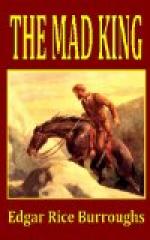The eye in the dark followed him. The man reached the side of the sleeper. Bending over he listened intently to the other’s breathing. Satisfied that slumber was profound he stepped quickly to a wardrobe in which a soldier had hung the clothing of both the king and the American. He took down the uniform of the former, casting from time to time apprehensive glances toward the sleeper. The latter did not stir, and the other passed to the little dressing-room adjoining.
A few minutes later he reentered the apartment fully clothed and wearing the accouterments of Leopold of Lutha. In his hand was a drawn sword. Silently and swiftly he crossed to the side of the sleeping man. The eye at the crack beside the gilded frame pressed closer to the aperture. The sword was raised above the body of the slumberer—its point hovered above his heart. The face of the man who wielded it was hard with firm resolve.
His muscles tensed to drive home the blade, but something held his hand. His face paled. His shoulders contracted with a little shudder, and he turned toward the door of the apartment, almost running across the floor in his anxiety to escape. The eye in the dark maintained its unblinking vigilance.
With his hand upon the knob a sudden thought stayed the fugitive’s flight. He glanced quickly back at the sleeper—he had not moved. Then the man who wore the uniform of the king of Lutha recrossed the apartment to the bed, reached beneath one of the pillows and withdrew two neatly folded official-looking documents. These he placed in the breastpocket of his uniform. A moment later he was walking down the spiral stairway to the main floor of the castle.
In the guardroom the troopers of the Royal Horse who were not on guard were stretched in slumber. Only a corporal remained awake. As the man entered the guardroom the corporal glanced up, and as his eyes fell upon the newcomer, he sprang to his feet, saluting.
“Turn out the guard!” he cried. “Turn out the guard for his majesty, the king!”
The sleeping soldiers, but half awake, scrambled to their feet, their muscles reacting to the command that their brains but half perceived. They snatched their guns from the racks and formed a line behind the corporal. The king raised his fingers to the vizor of his helmet in acknowledgment of their salute.
“Saddle up quietly, corporal,” he said. “We shall ride to Lustadt tonight.”
The non-commissioned officer saluted. “And an extra horse for Herr Custer?” he said.
The king shook his head. “The man died of his wound about an hour ago,” he said. “While you are saddling up I shall arrange with some of the Blentz servants for his burial—now hurry!”
The corporal marched his troopers from the guardroom toward the stables. The man in the king’s clothes touched a bell which was obviously a servant call. He waited impatiently a reply to his summons, tapping his finger-tips against the sword-scabbard that was belted to his side. At last a sleepy-eyed man responded—a man who had grown gray in the service of Peter of Blentz. At sight of the king he opened his eyes in astonishment, pulled his foretop, and bowed uneasily.




